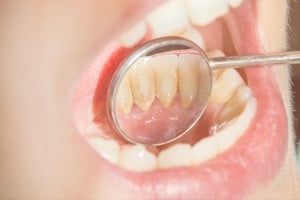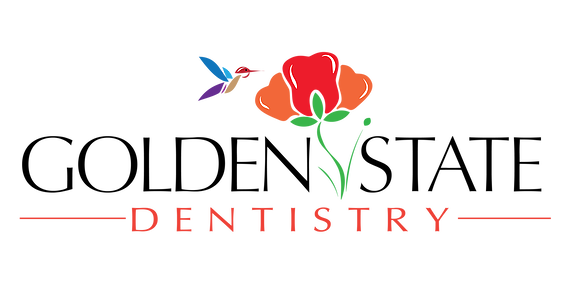 A whopping 68% of adults have dental tartar, also called calculus. Dental tartar is a hard, calcified deposit that forms and coats the teeth and gums. If plaque is not removed on a regular basis, such as through brushing and flossing, it hardens within 24 to 72 hours and becomes tartar. The tartar buildup can make it difficult to brush and floss properly, leading to cavities, gum disease, and bad breath. Because tartar is strongly bonded to the tooth enamel, it can only be removed by a dental professional.
A whopping 68% of adults have dental tartar, also called calculus. Dental tartar is a hard, calcified deposit that forms and coats the teeth and gums. If plaque is not removed on a regular basis, such as through brushing and flossing, it hardens within 24 to 72 hours and becomes tartar. The tartar buildup can make it difficult to brush and floss properly, leading to cavities, gum disease, and bad breath. Because tartar is strongly bonded to the tooth enamel, it can only be removed by a dental professional.
Causes
Even if you take good care of your teeth, you still have bacteria in your mouth that mixes with sugary or starchy food when you eat. As a result, a sticky film called dental plaque is formed, coating your teeth, gums, and dental restorations. Plaque houses acid-forming bacteria that can damage tooth enamel and cause cavities. If you fail to remove plaque regularly, it hardens to become tartar. Tartar is very rough and porous, can only be removed with special dental tools, and can lead to gum recession and gum disease, if left untreated.
Although everyone develops plaque, you are more at risk if you:
- Eat food high in sugar (e.g. sweets, cakes, etc.)
- Eat food high in carbohydrates (e.g. bread, pasta, potato chips, etc.)
- Have dry mouth due to not drinking enough water or taking certain medications
- Smoke or chew tobacco
There is no way to completely avoid plaque, but you can prevent it from accumulating by brushing and flossing your teeth regularly.
Prevention
The best way to prevent tartar is by taking good care of your oral health. You can do this by:
- Brushing your teeth twice a day for two minutes at a time and flossing daily
- Using an electric toothbrush, replacing the bristles every 3 months
- Using a fluoride toothpaste
- Visiting your dentist every 6 months for routine checkups and cleanings
- Eating a healthy balanced diet, and limiting the consumption of sugars and starches
- Avoiding smoking or chewing tobacco
Removal
Tartar buildup bonds strongly to tooth enamel and must be removed by a dental professional. This can be done with a professional cleaning, debridement, or scaling and root planing.
If you do not have dense deposits and your teeth have not been affected by bone loss or periodontal disease, getting a regular dental cleaning every six months is recommended by the American Dental Association. At your regular dental checkup and cleaning, your dentist or dental hygienist will use a scaler to remove any dental plaque, tartar, and stains around your gums and between your teeth.
A debridement is recommended for people who have dense calculus on their teeth that interferes with the dentist's ability to perform a comprehensive oral evaluation. Ultrasonic instruments and hand tools are used to fracture tartar and remove it.
If you have pockets between your teeth and gums, or periodontal (gum) disease you may need scaling and root planing, which is a deep cleaning. This procedure is performed using local anesthesia, and plaque and tartar are removed above and below the gumline, all the way down to the bottom of the pocket. Afterwards, the teeth roots are smoothed out to help your gums reattach to your teeth.
It's important to be proactive and take care of your teeth before it comes a bigger, more costly problem in the future.
Do you have dental tartar? Contact us at (925) 705-7093 or request an appointment online.


.jpg?width=712&name=GSD-Scalloped-Tongue-Causes-and-Treatment-Blog-01.27.2210.21.21%20(1).jpg)











.jpeg?width=425&name=GSD-How-to-Combat-Dental-Plaque-07.22.24-2%20(1).jpeg)



